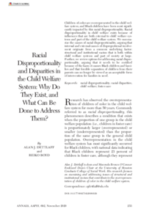Abstract
Children of color are overrepresented in the child welfare system, and Black children have been most significantly impacted by this racial disproportionality. Racial disproportionality in child welfare exists because of influences that are both external to child welfare systems and part of the child welfare system. We summarize the causes of racial disproportionality, arguing that internal and external causes of disproportional involvement originate from a common underlying factor: structural and institutional racism that is both within child welfare systems and part of society at large. Further, we review options for addressing racial disproportionality, arguing that it needs to be rectified because of the harm it causes Black children and families and that forcible separation of children from their parents can no longer be viewed as an acceptable form of intervention for families in need.
This article is part of the volume The Contemporary U.S. Child Welfare System(s): Overview and Key Challenges.

